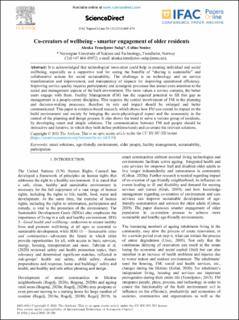| dc.contributor.author | Temeljotov Salaj, Alenka | |
| dc.contributor.author | Senior, Coline | |
| dc.date.accessioned | 2022-03-11T07:32:14Z | |
| dc.date.available | 2022-03-11T07:32:14Z | |
| dc.date.created | 2021-11-15T22:22:49Z | |
| dc.date.issued | 2021 | |
| dc.identifier.citation | IFAC-PapersOnLine. 2021, 54 (13), 669-674. | en_US |
| dc.identifier.issn | 2405-8963 | |
| dc.identifier.uri | https://hdl.handle.net/11250/2984419 | |
| dc.description.abstract | It is acknowledged that technological innovation could help in creating individual and social wellbeing, especially as a supportive tool for seeing the benefits of “sharing is sustainable” and collaborative actions for social sustainability. The challenge is on technology and on service transformation and improvement, and transparency of impacts for improving operational efficiency. Improving service quality requires participatory and synergetic processes that attract extra attention to the social and management aspects of the built environment. The more values a service contains, the better users engage with them. Facility Management (FM) has the required potential to fill this gap as management is a people-centre discipline. This requires the central involvement of FM in the planning and decision-making processes, therefore its role and impact should be enlarged and better communicated. This paper is evidence-based research, which shows how FM can extend its impact on the build environment and society by bringing the socio-physiological aspect and the community in the central of the planning and design process. It also shows the trend to serve a various group of residents, by developing smart and simple solutions. The communication between FM and people should be interactive and iterative, in which they both define problems/needs and co-create the relevant solutions. Keywords: smart solutions, age-friendly environment, older people, facility management, sustainability, participation | en_US |
| dc.language.iso | eng | en_US |
| dc.publisher | International Federation of Automatic Control (IFAC) | en_US |
| dc.rights | Attribution-NonCommercial-NoDerivatives 4.0 Internasjonal | * |
| dc.rights.uri | http://creativecommons.org/licenses/by-nc-nd/4.0/deed.no | * |
| dc.title | Co-creators of wellbeing - smarter engagement of older residents | en_US |
| dc.type | Peer reviewed | en_US |
| dc.type | Journal article | en_US |
| dc.description.version | publishedVersion | en_US |
| dc.source.pagenumber | 669-674 | en_US |
| dc.source.volume | 54 | en_US |
| dc.source.journal | IFAC-PapersOnLine | en_US |
| dc.source.issue | 13 | en_US |
| dc.identifier.doi | 10.1016/j.ifacol.2021.10.528 | |
| dc.identifier.cristin | 1954905 | |
| cristin.ispublished | true | |
| cristin.fulltext | original | |
| cristin.qualitycode | 1 | |

